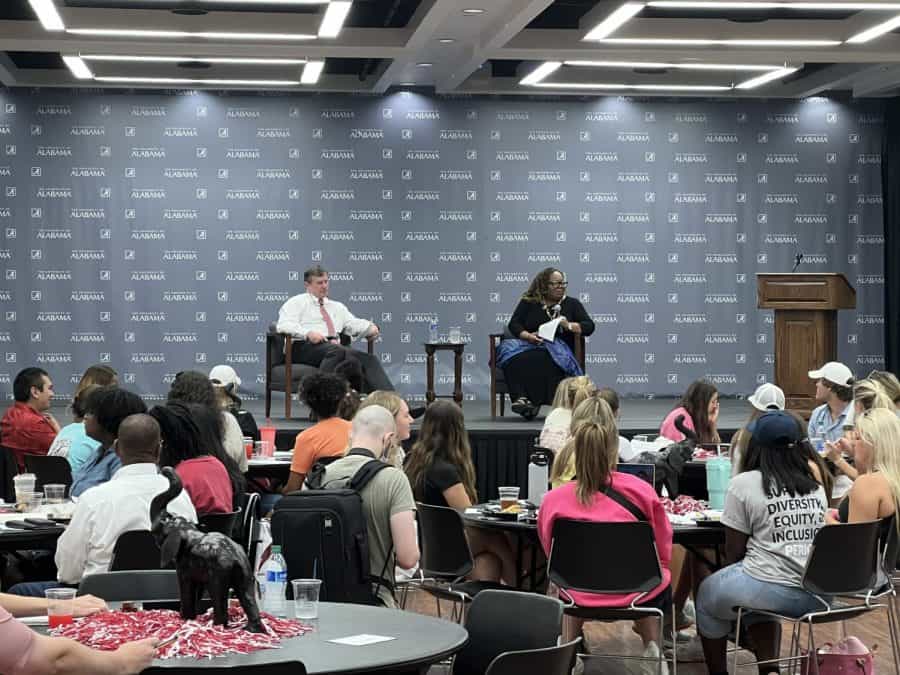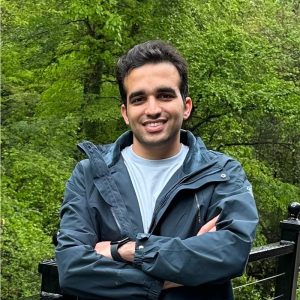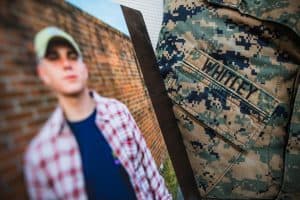‘What can we do at Alabama to make our campus more inclusive’: UA Town Hall asks students what they need
September 25, 2022
Over 80 students assembled in The University of Alabama Student Center’s ballroom on Thursday for a town hall meeting hosted by G. Christine Taylor, vice president and associate provost for diversity, equity and inclusion, and Steven Hood, the interim vice president of student life.
According to its flyer, the town hall, which convened from 5-7 p.m., was created to allow students to speak with University officials, student leaders and their peers about making the University a more inclusive space because “building a more inclusive campus requires us all to be engaged.”
“Tonight, is about focusing our energy … on the campus culture, as we hear about the things that we can do to make Bama more inclusive, more welcoming for everyone that’s going to be here. We start everything with the end in mind; this is about you,” Taylor said.
Following her opening remarks, Taylor gave a short presentation to the students, which included a video that contextualized the campus’s history with diversity and updates on what’s currently happening with diversity efforts on campus. From there, Taylor directed the students to engage with a list of pre-prepared questions. Once done, Hood took the stage with Taylor to discuss the students’ answers.
After setting a few ground rules, which included making the students feel comfortable speaking authentically, Taylor and Hood opened the floor with a question from the list.
“If we were in the 2023 SEC diversity and inclusion championship playoff game, what new or different strategies would you need to do here at Alabama to win?” Taylor asked.
Kiana Younker, a junior majoring in dance and the vice president of the Bama Indigenous Student Organization Network, said that question was the first one she answered, and her answer was in- and out-of-state diversity outreach programs.
She said as an out-of-state student, she came to the University with no prior knowledge of what the campus was like, and as a white-passing person of color, she received a lot of aggressive commentary in the past three and a half years.
She said with indigenous students making up .3% of campus — a percentage that hasn’t seen a substantial change since before fall of 2014 according to the Office of Institutional Research and Assessment— and Moundville Archaeological Park being 20 minutes away, the University was missing an opportunity to reach out to neighboring states where the Alabama indigenous tribes have been removed.
“We’re not looking to indigenous people for education. We’re not looking to them to come seek out education. It’s really hard to come to a place where you know you’re not welcome and where policies have been put in place to make you unwelcome,” Younker said. “And it doesn’t have to be just indigenous systems; it’s just that I speak on behalf of everybody indigenous, as being part of .3% of a demographic.”
After Younker, more students rose to answer the question.
Taylor White, a senior majoring in human performance exercise science and psychology, critiqued what she felt was an inorganic use of minorities in promotional materials that she thought could benefit from a new and more thoughtful approach.
She said the University shouldn’t take pictures just to say, “Oh, look, Bama has Black people at their school,” because that’s outdated.
“Walking up on campus … to any minority and asking for a picture is weird, and it makes me uncomfortable because it makes you feel like kind of a token to make it look like inclusion on the campus, like make it organic,” White said.
Yechiel Peterson, a senior majoring in nursing and African American studies, said that a good strategy for the University would be having a lower tolerance for dealing with actions of racism around campus.
“Here at the University, I feel like we have more of an intolerance with plagiarism than we do actual racism, and I feel like that’s not really conducive to a learning environment,” Peterson said. “If we raise the standards and how we treat racism, and acts of aggression to racism, then I feel like we could move in the right foot forward to solving our issue.”
He said if the University gives “a slap on the wrist” to everyone who does something racist, there’s no expectation for anybody to behave a certain way.
“Like we’re just allowing things to happen, and we never get like a proper response on those actions,” Peterson said.
Taylor thanked him for his response but said it’s important to note that a part of the challenge is that freedom of speech gives people the space to say things that people might find “absolutely unacceptable.”
However, she said she hopes that we get to a place where people hold each other accountable as a community. One way that students, staff and faculty can do this is through incident reporting.
“The more you exercise your space, the bigger our space gets. It’s like Dr. Hood said, this is not a one-person duty; it takes us all being willing to say, ‘No, I don’t like that’ that’s what I’m trying to get us to go,” Taylor said.
Dequiala Kelly, a senior majoring in human development and the president of the Black Faculty and Staff Association Ambassadors, said her main concern is the Hallowed Ground Tour, which was created in 2016 by Hilary Green, a former UA associate professor of history, to educate on the history of slavery at the University.
Kelly said she wants the Hallowed Grounds Tour added to Bama Bound Orientation. She said Bama Bound talks about different opportunities on campus and the football team, but it also needs to talk about its history and where it comes from.
“Slavery had a huge impact on campus, and slaves built this campus. Black people built this campus … and we talk about inclusivity, we talk about diversity, we can’t just throw around those words and not actually have action to it,” Kelly said. “So, I think putting the Hallowed Grounds Tour into Bama Bound will help with incoming students because how do we expect change to happen when we don’t actually talk about that? We don’t talk about the history that it came from.”
Farrah Sanders, a graduate student studying gender and race studies, said though the tours are something the University claims are important, as someone with a role in the Hallowed Grounds Tour and someone who studied under Green as a research assistant, her and her department don’t feel as though it’s treated like it’s important.
“We feel as though it’s something to be brought up when diversity is brought into question, but on a regular Thursday, there’s no support,” Sanders said. “We’re not very sure if those who give tours are going to be paid or given some sort of compensation for having to not only take time out of their schedule to give these tours, but to constantly make sure that the history is updated because history is always changing and evolving.”
Other students suggested diversifying classrooms, focusing on retention through scholarships, creating a community where people feel welcome and encouraged to take part in student leadership, acknowledging the Machine’s role in the issue, and creating a safe and more inclusive space for LGBTQ+ students in on-campus housing. The discussion then evolved into a question of why an inclusive campus is important to the students.
Kyla Goodloe, a junior majoring in criminal justice, said having an inclusive campus is important because it makes her feel more comfortable. She said there’s no reason she, as a young Black woman, should feel uncomfortable because she’s the only Black person in a space.
Other students emphasized the importance of inclusivity on campus because of how much people can learn from each other.
As the conversation continued and students expressed their opinions on the importance of inclusivity and how to promote it on campus, one student rose with a simple request for advice.
Bella Cross, a senior majoring in public relations, said as someone who went to past diversity, equity and inclusion events, she noticed some people were coming to those events and actively pushing against people who cared about inclusivity. She said they were being intentionally disruptive during the events and rude on social media.
“So, I was wondering, I feel like there’s a few of us in here who are part of organizations that also don’t quite do what they can to promote inclusivity and promote diversity and equity. Do you have any advice for people who are like fighting to get their voices heard or fighting to get people to care about inclusivity, but also in a way that’s like, safe?” Cross said. “Because it hits a point where I know as a Black woman, it gets so exhausting — like you care so much, but then people are pretending to care, people are constantly coming to you and being like ‘well what does this mean and why do I have to do it?’ Like, how do you educate and get people to care, but in a way where you’re not hurting yourself?”
Hood admitted that there were times in his life when those conversations were “very uncomfortable.”
He told the students about the first time he’d had one of those conversations. He was in his late 20s, working in his first job in higher education. While on a trip with his boss, Gary, an older Black man, to find a venue for a banquet, he noticed that as they looked at different places, the salespeople kept talking directly to him.
Hood said he remembered talking to his boss about it after, and he helped him realize that day that this was common for him.
“So, I say that some of us who are in the majority, we don’t know what we don’t know. And we need somebody to help us. And we might be intimidated by showing up to an event where there’s a lot of people. … But if I can have a one-on-one conversation with somebody I know, in my case in a car, driving back to work, it can open my eyes, and it takes time,” he said. “And so that’s not 1,000 people in the room that are going to hear a message and change their life, but for me, it was a one-on-one moment with someone I trusted to hear that, and it took a while to sink in even that wasn’t just that moment, I had to have some additional conversations.”
Taylor added that “the fatigue is real,” and it’s good to get an ally who generally isn’t like you for those trying to make a change.
“Do not try to do this by yourself. You’ll be consumed,” she said. “The Civil Rights Movement was an allyship process. No group does it by itself, so get other people … to help you in the process.”
However, White said she’s noticed it always seems like minorities must make themselves uncomfortable to educate others. Still, she feels minorities shouldn’t have to keep “breaking down a wall that’s already so high.”
White said a lot of times she feels like inclusion and diversity on this campus are a checkpoint to get here, but when she got here, she felt invisible.
The conversation about the role of the student in these settings continued among the students and Taylor and Hood until Younker asked the night’s final question.
“I feel like we’ve given you guys a lot of feedback, but we haven’t heard any sort of like structural plan of like how are we going to take your comments and mobilize them?” Younker said. “So, I’d love to know how can you ensure the sustainability of minority student groups?”
Taylor said anything that she starts; she starts with the understanding that it’s going to be sustainable long-term, so everything they’ve been doing, they will continue doing.
Hood said there had been little steps along the way, but that may not be as evident for students who are here for a shorter period of time, making it harder to see the progress.
As the event ended, Taylor urged students to take advantage of the multicultural resource guide on the division of diversity, equity and inclusion’s website and to send any questions they have to them at diversity@ua.edu.
“It’s been wonderful to hear from you and your perspectives, and I hope you found this of value,” Taylor said.
And at the end of the day, Taylor said that the division will continue to highlight their work toward diversity, equity and inclusion, and better connecting with the students, as well as assessing what is working and what isn’t working for students.




















